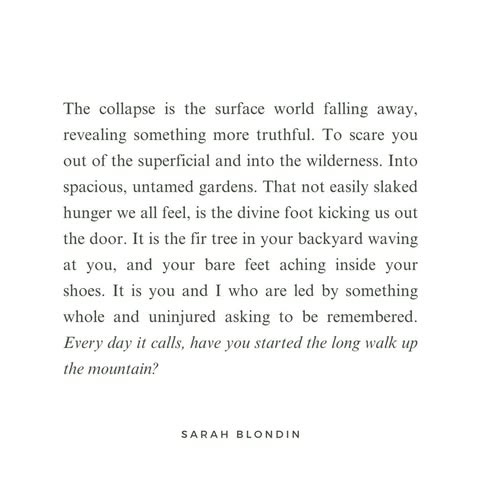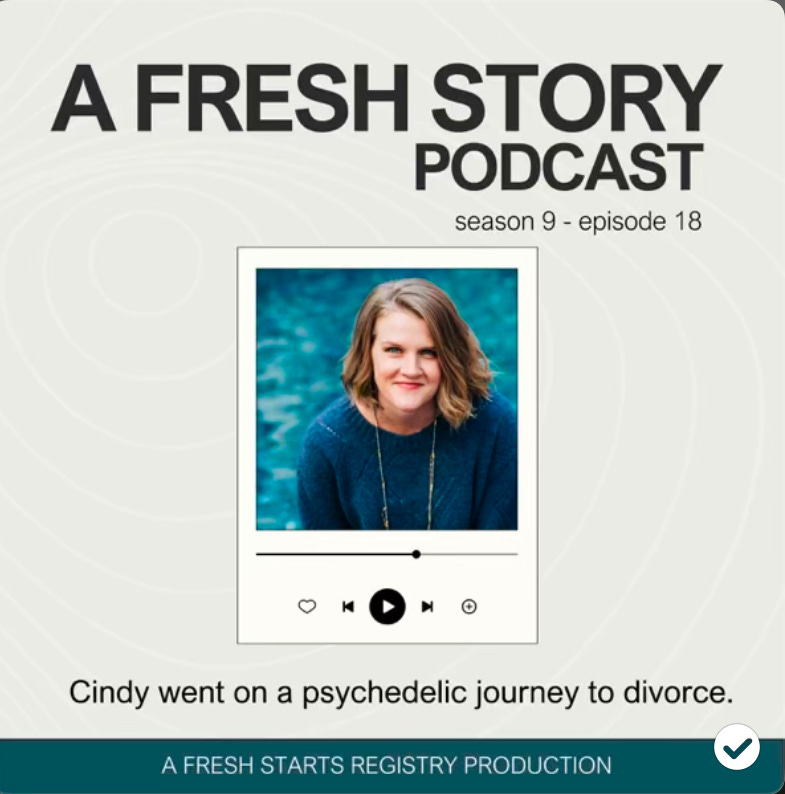Despite how confessional some of my writing may appear, I think we all know how much is left out. Some of this is intentional, to protect myself and my family and because I do not owe anybody everything. Some of it comes from not being ready to share. Some of it is yes, I have written an entire book about this revolution in my life (and believe me, even in the book, a lot is left out).
But I’m ready to open up about an aspect of my divorce that I’ve kept hidden. That I needed psychedelics to admit that I wanted to leave my marriage.
I know. Perhaps you weren’t expecting this. I wasn’t either. I have been a rule follower my whole life. I’ve still never even smoked pot. What was I doing embarking on a therapy that utilizes a still illegal drug?
I needed psychedelics to admit that I wanted to leave my marriage.
It was June 2022 and I’d hit the point of total desperation. My marriage was in shambles, we’d been in couples therapy for well over a year, it had been a year since this frustrating discussion, and things were not getting better.
But I did not know how to leave. Leaving wasn’t even on the table.
No one teaches women how to leave. We are taught to stay, to soldier on, to go to couples therapy and individual therapy, to fix ourselves, to fix the relationship. There are thousands of books on how to improve your relationship. Very few on how to throw in the towel.
So despite the fact that our marriage was over, I didn’t know how to call time of death. To give up on the dream I’d spent most of my adult life building. But living it was no longer a dream. It felt more like a nightmare.
Now, things could have been worse. But I think we all know the quiet desperation of feeling stuck in the movie Groundhog’s Day, doing everything we can to carve new pathways, try “opposite action,” only to find ourselves in the same…damn…fight.
Some couples figure out how to evolve past these fights or at least change their tempo. But we were stuck in a cycle I didn’t know how to escape.
I read Michael Pollan’s book How to Change Your Mind about the power of psychedelic therapy when it was released in 2018. I read it for research for two different books I was ghostwriting at the time, and the research within was powerful. About the long history of the therapeutic use of these various substances as well as the ways they showed great promise in the treatment of depression, addiction, and PTSD.
For those facing a terminal cancer diagnosis, “over the course of a single guided psychedelic ‘journey,’ they reconceived how they viewed their cancer and the prospect of dying. Several of them said they had lost their fear of death completely.”
Many who embarked on psychedelic therapy “ranked their psilocybin experience as one of the most meaningful in their lives, comparable ‘to the birth of a first child or the death of a parent.’ Two thirds of the participants rated the session among the top five ‘most spiritually significant experiences of their lives.’”
One of the properties of these substances was something called “mind loosening,” in other words, they disrupted your go-to neural pathways, and often relaxed the ego’s defenses. This opened up opportunities for new pathways, new insights, new beliefs.
Despite the fact that our marriage was over, I didn’t know how to call time of death.
Fast forward to 2022. We were finally coming out of the crucible that was the pandemic. My marriage did not thrive during this time (I chronicled this for Scary Mommy here). I was realizing that what I had done during the pandemic, aka sacrifice my career to care for the kids, was something I’d been doing throughout our marriage. I’d shifted to part time and tried to squeeze my career around times convenient for my children. This stifling had been necessary, I thought. But as I did a stifling on steroids during the pandemic, I realized that it wasn’t necessary. That I’d sacrificed myself on the altar of motherhood thanks to the inner patriarchy reigning unheeded in my heart and the patriarchy inherent the very structure of heterosexual marriage. But now I wanted to set myself free.
In a strange twist of fate, I was only able to recognize my unhappiness because I had stopped ghostwriting. I could hear my own voice for the first time in years. It had been drowned out while I wrote books for other people. In fact, I now think becoming a ghostwriter was a convenient way to escape myself, mute myself, ghost myself, so that I could avoid all the feelings that were within.
But even as I knew I was unhappy, leaving my marriage was never an option. Yet I knew I had to do something. Something to figure out how to deal with the problems in my relationship. I had been in individual therapy for two and a half years. We’d been doing couples therapy for over a year. Despite all those fees and hours on couches, we were still doing the same dance of he said, she said, if you’d just, but I tried.
My ex had been asking me to try SSRIs due to my anxiety. And I couldn’t deny I was an anxious person. But rather than go on a medication that I’d likely be on for the rest of my life, I wanted to try this other avenue. People reported feeling transformed after just one psychedelic session. Another issue? You often cannot be on SSRIs if you want to try this therapy.
One of the benefits of living in Silicon Valley is that it was not hard to find a practitioner. One of my friends had a contact. One phone call and I was meeting this therapist in person. After three one hour sessions to discuss my intention in starting this work, and to establish a sense of safety and trust between me and this therapist, we scheduled my first “journey.”
My MDMA therapist required that I commit to three journeys. The medicine unfolds in a way you could not anticipate nor control. Knowing that you had time, that not all the work had to happen in one session, allowed the process to unfurl in its magical way, and enabled you to go at a sustainable pace. Each journey had to be spaced at least six weeks apart so that the medicine could fully leave your system. She explained that the medicine keeps working, even after the journey. You may no longer be high, but it continues to provide wisdom, insight, illumination.
I went into this work to save my marriage. We weren’t just fighting about chores, but deep down, I felt like something was wrong with me. I wasn’t “available” to my husband (something he’d said countless times), and if we could just fix that, everything would be better. Maybe it was my anxiety that was the problem. So in talking with this therapist, we drilled down my intention to this question: why don’t I feel safe?
I was stuck in a stance of self-preservation. I was scared, anxious, walled off, yes, unavailable.
I now think becoming a ghostwriter was a convenient way to escape myself, mute myself, ghost myself, so that I could avoid all the feelings that were within.
I was originally disappointed that this therapist used MDMA. MDMA has shown most promise with people who struggled with PTSD, allowing them to return to their difficult past with some emotional distance and self-compassion. I didn’t struggle with PTSD (so I thought). I wanted access to psilocybin. I felt like there was a problem in my brain. Why was I so neurotic? Why was I so controlling? Psilocybin is what rewires our brains.
But MDMA was better than nothing.
No one really knows exactly how MDMA works. It was invented by Merck Pharmacists in 1912 but didn’t start being used therapeutically until 1976. Once it hit the streets and began to be called “Ecstasy” and used in the clubs in the 1980’s, it was quickly criminalized and became a Schedule I substance in 1985.
MDMA is “known to increase concentrations of a number of important hormones, including oxytocin, vasopressin, cortisol, and prolactin,” explains Dr. Bessel van der Kolk in his bestselling book The Body Keeps the Score. “… it increases people’s awareness of themselves; they frequently report a heightened sense of compassionate energy, accompanied by curiosity, clarity, confidence, creativity, and connectedness…it decreases fear, defensiveness, and numbing, as well as helping to access inner experience.”
Ann Schulgin, the wife of Sasha Schulgin who was the first person to discover the therapeutic properties of MDMA, calls it “penicillin for the soul.”
I went on my first journey on a sunny morning in June, my oldest daughter away at sleepaway camp for the very first time. I took the pill around 9:30 on an empty stomach, donned an eye mask, my therapist turned on some music and I waited for the medicine to take hold.
MDMA journeys typically last from four to six hours. My therapist was with me the entire time, sitting by my side, in case I needed any support. She told me to tell her anything I was seeing or thinking in real time that I wanted to remember from the journey and she would write it down. She called this “throwing rubies up from the mine.” Sometimes it would be a simple phrase: There is nothing left to prove. Sometimes it was a feeling: My arms are really tired.
But for the most part, on my first journey, I was silent. And my inner psyche took me places I never expected to go. My therapist checked in on me occasionally. But I was doing the work on my own. It was like my body knew what I needed to heal. Where I needed to go in my past, what I needed to see. It was all, right there, waiting for me, underneath the surface.
I go into detail about this deeply spiritual work in my book, including all three journeys that I took that led me to truly see my life clearly for the very first time. But one of the greatest gifts MDMA gave me was the ability to admit how I felt about my marriage.
It was like my body knew what I needed to heal. Where I needed to go in my past, what I needed to see. It was all, right there, waiting for me, underneath the surface.
MDMA is somewhat like truth serum, in other words, it gets underneath all the stories we are telling ourselves, all the barriers we have erected to protect ourselves from inconvenient truths. If we think of it in terms of Internal Family Systems (IFS) and our various “parts,” the medicine allowed certain parts of me to take a step back, to release their grip on the steering wheel. I had to let the good girl sit the hell down, let the soldier stop her stoic trudging.
The good girl does not leave her marriage. And I had been a good girl for so long. From very early on in my childhood, I was quiet, shy, compliant, the perfect student who got straight A’s. That tendency only got stronger when I converted to evangelical Christianity in my teen years, a religion that told me exactly how to act to get the gold star (and God’s love).
I’d done all the things expected of me as a woman. Got married, had children, sacrificed my career to be there for them.
But in my psychedelic therapy, the truth became crystal clear. I didn’t want to be married anymore. The recognition landed like a pile of bricks on my chest, heavy, uncomfortable, but undeniable.
This was not the information I was going in for. I was doing this work to save my marriage, not end it! And yet, I couldn’t unsee the truth. I wanted to leave. And the true relationship I needed to save was the one I had with myself.
MDMA uncovered so much more than just the truth that I wanted to leave my marriage. But that insight might have been its greatest gift. Because without it, I think I’m still married. I think I’m still struggling. I think I’m still sitting on that marriage therapist's couch every Wednesday morning, circling the same fights, the same arguments. Soldiering on.
Now, not everyone is ready for MDMA therapy. I think it was so effective for me because I had been doing therapy with my traditional therapist for three years. I was starting to write in my own voice. I wanted to know what was trapping me. I was desperate to get unstuck. Did MDMA upend everything about my life? Yes. But I was ready to have it be upended.
I can’t recommend MDMA therapy highly enough but it is not for the faint of heart. It takes every ounce of bravery you have to go within, to give up those protective barriers, to see yourself and your life in unvarnished truth. Did it live up the hype presented in Pollan’s book? Absolutely. There is my life before MDMA therapy. And then, my life after.
This is the content of my memoir that I have been writing. Yes, it is a book about how I erased myself, how I learned to disappear through being a twin, a good girl, good Christian, a wife, and mother. And of course, as a ghostwriter. But then it becomes a story of how I used psychedelics to get myself back. How I reclaimed myself, my life, my soul, and started over.
I talk for the very first time about this therapy with Olivia Dreizen Howell and Jenny Dreizen on A Fresh Story podcast, recently released. It offers more insight and details about this complex, magical, life-changing work.
I wish the world weren’t designed to almost require that we detach from ourselves. I don’t think I’m alone in how deeply I disappeared in the roles of woman, wife and mother. I think this is why there is such a resurgence of stories of midlife women coming back to themselves. Not everyone requires psychedelics. Some need a motel room in Monrovia. Some need a young, hot intern. Some need to let themselves run wild. But we often need something to help us name our desire for reclamation and ultimately, freedom.
May we not be afraid to tell stories of our rebirth.
I have opened up commenting on this post to all readers. I had paywalled this option due to the number of misogynistic comments I was receiving which seemed to tarnish the safe space I was hoping to provide at The Mother Lode. But given the content of this post, I’d love to answer questions and engage on this topic more openly, so let me know what you think!
Liking this post, restacking it, or leaving a comment helps it find more readers. If you are reading this as an email, there is a heart button at the top and bottom of this email. Click on it and it will take you to the Substack website where you can also leave a comment. If you are reading it online, just click the heart button at the top or bottom of this post or the icon of two arrows which allows you to restack it. I appreciate your support!
GOING FURTHER
How to Change Your Mind, Michael Pollan. There is both a book as well as the Netflix documentary series that has an entire episode dedicated to MDMA.
Are Psychedelics an Answer? with Dr. Hilary McBride, We Can Do Hard Things podcast, episode 240.
Cindy went on a psychedelic journey to divorce, A Fresh Story Podcast, season 9, episode 18.








I cannot wait to read your memoir. This line is so true: "No one teaches women how to leave." SO TRUE. Loved this post.
Thank you, for being vulnerable with us readers.
This has given me a lot to think about, regarding seeing if therapy involving MDMA could benefit me.
I, as I’m sure all your readers, appreciate the fact that you’re always willing to write with openness, and that you don’t skip over the hard truths.